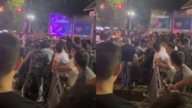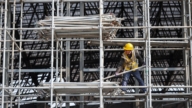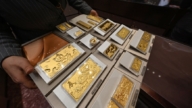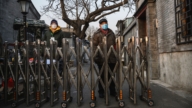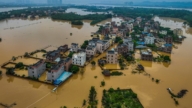【新唐人2013年01月31日訊】位於柏林的「透明國際組織」,週二在台灣舉行新聞發佈會。「透明國際」在有關「全球國防清廉指數」的報告中提出,雖然中共軍方正在與腐敗作鬥爭,但這一過程缺乏政治監督、沒有檢舉機制。中國被評為「高危」國家。
中國擁有世界上最大規模的軍隊。但「透明國際組織」新推出的「全球國防清廉指數」報告,中國被評為「高危」國家。《德國之聲》轉載《法新社》的報導指出,因為軍方並不允許因反腐而引發對軍方的質疑。因此「國防領域的監督力度很弱,而且沒有有效的檢舉機制。」
是甚麼原因導致中國軍隊的腐敗?
政論家伍凡:「中國的軍隊,第一,它不是一個國防軍,它是一個黨衛軍,聽共產黨領導,一切都聽共產黨的。共產黨本身是一個大貪污集團,在世界上恐怕要數得上號的,所以下面管的軍隊也就是必然貪污的,尤其是高級官員,相當一部分是太子黨,太子黨的父母親,要嘛是元老,要嘛是高級幹部,而那些元老、高級幹部都是貪污集團相當高級的貪污份子,所以他們的子女、他們的親戚去當將軍,能不貪污嗎? 」
「透明國際」台灣分部主任凱文•葉(Kevin Yeh)接受媒體採訪指出,問題在於,中國大陸的軍方是一個「封閉的系統」。而軍方和黨的權力,比政府執行部門更大。更糟的是,中國並沒有一個機構,能夠有效的監督反腐。目前的機制下,反腐只是內部的自我控制,軍隊十分不透明,容易滋生腐敗。
伍凡:「第二,中國的軍隊是一個非常封閉型的,中國的法律管不到它,只有共產黨的軍事委員會能管到它,連地方的委員會都管不了它,所以獨霸一方,並且現在是軍費年年往上升,其中相當一部分都被他們貪污了,比地方的黨政官員貪污的更厲害,更兇! 」
報導說,中國人民解放軍共有230萬人。官方公布的國防開支,去年(2012年)增加11.2%,達到6700億元人民幣。
伍凡:「從第一次伊拉克戰爭以後,他們(中共)就走上了大量投資軍費,每年都以百分之十以上的軍費增加,而現在中國所謂開發的這些武器,絕大部分都是仿造的多,要嘛是拷貝人家的,要嘛是盜竊人家的機密,完完全全自己開發的幾乎沒有,就是現在造出來的武器,當真正成為一個戰鬥力,起碼要五年到十年以後。」
政論家伍凡還表示,中國軍隊的戰鬥力非常低,主要是因為,軍人的官位是買來的,陞官仍靠買賣。
而習近平上任兩個多月,已六次高調矢言反貪,與此同時,當局還頻頻展示國產武器的成果,顯示中國可能加大國防的投入。
《透明國際》的報告指出,中國軍隊沒有私人的承包商,缺乏競爭,容易滋生腐敗。同時,中國軍隊的中央集權結構,更容易產生腐敗的風險。
旅美「中國社會民主黨中央委員會」主持人 劉因全:「從江澤民開始我們知道,在江澤民當總書記以後,中國是全面腐敗,我們知道軍隊中有一些軍頭,他就是靠巴結江澤民上去的,是江家黨,江家軍,所以這些軍頭們一路得到提拔,得到重用,他們的貪污腐敗也得到江澤民的庇護、保護。這樣就造成整個軍隊的貪污腐敗,一發不可收! 」
香港《蘋果日報》專欄評論指出,習近平拉升了民間對當局反貪的期望,但一黨專政的體制不變就關不住權力,每每反貪風暴過後,貪腐問題越發嚴峻,官民衝突越發嚴重。
最新的「全球國防清廉指數」共對82個國家進行評分。澳大利亞和德國位居榜首,榜尾主要是非洲國家,包括安哥拉、喀麥隆和埃及。
採訪/李韻 編輯/周平 後製/黎安安
Global Military Corruption: China Scored “High-Risk"
Berlin-based Transparency International held
a press conference on January 29 in Taiwan.
Its latest global index on Government Defense
Anti-Corruption says that China’s army is combating against corruption,
but lacks oversight and a whistleblower system.
The anti-corruption index ranked China
as a high-risk country.
China has the largest active army in the world.
However, in the latest index on Government Defense
Anti-Corruption released by Transparency International (TI), China was ranked high-risk.
Mark Pyman, director of IT’s defense work in the UK,
said that China’s military does not allow the level of scrutiny required to ensure an anti-graft campaign is succeeding.
“It has very little oversight of a defense and armed forces
policy and no effective whistleblower system," Agence France-Presse reported.
What has caused the corruption in China’s army?
Political commentator Wu Fan: “China’s army, firstly,
is not a national defense force.
Rather, it serves the Chinese Communist Party (CCP).
The CCP in itself is a leading corruption group in the world,
so naturally, the army under its leadership is not immune.
Especially those senior army officers, most of them are
princelings, or princelings’ parents, children of CCP veterans, or of CCP top-level officials.
These veterans and senior officials are corrupt,
how could their children and relatives be immune
when becoming army generals?”
Kevin Yeh, director of TI’s Taiwan Division, told the media
that Mainland China’s military is a closed system.
The military and the CCP have more power than
the executive branch of government.
And even worse, China has no an effective watchdog
agency to serve as anti-graft.
Under the existing mechanism, anti-graft is only an internal
self-control, and along with the army’s high opacity,
all these easily breed corruption, according to Kevin Yeh.
Wu Fan: “Second, China’s army is very enclosed.
It’s a law-free zone, only governed by CCP’s military
commission, so it’s a standalone force.
Each year, the military expenditure has soared,
the majority were pocketed by those military commission officials.
They’re much more corrupt than those officials
at local authorities and local Party committees."
Reportedly, the People’s Liberation Army
has 2.3 million personnel.
The CCP official data on defense spending in 2012
has increased by 11.2%, to 670 billion yuan.
Wu Fan: “After the first Iraq war, the CCP began
to pump capital into the military.
The annual growth in military expenditure exceeds 10%.
Most of their newly developed weapons are counterfeit,
copied or stolen technologies from other countries, with very few being self-developed.
It’ll take at least five to ten years before its newly
manufactured weapons act as real combat power."
Wu Fan adds that China’s army has weak fighting capacity.
This is because that army officers bought their posts,
money paves the way for their promotions.
Since taking office two months ago, Xi Jinping
has touted combating against corruption six times.
Meanwhile, the authorities repeatedly display domestically
produced weapons, indicating more possible national defense investments.
TI’s report states that China lacks private military
defense contractors,
which means less competition and
susceptibility to corruption. And,
“the centralized structure of the Chinese state apparatus
caused the defense sector to be more prone to corruption.”
Liu Yinquan (Chair, Social Democratic Party of China):
“China’s nationwide corruption started during the reign of Jiang Zemin.
By currying favor with Jiang, some military chiefs got
promotions, who actually followed and worked for Jiang.
And Jiang protected their corruption,
this caused unchecked corruption in the entire army.”
Hong Kong’s Apple Daily comments that Xi Jinping raised
the public expectation on the authorities’ anti-corruption.
But under the one-party rule,
its power is impossible to be curbed.
The article remarks that after every anti-graft drive
staged in the past, corruption became even more severe.
That gave rise to more sharp clashes
between the regime and the public.
The latest Government Defense Anti-Corruption Index
scored a total of 82 countries.
Australia and Germany topped the list, some African nations
including Angola, Cameroon and Egypt were ranked lowest.


